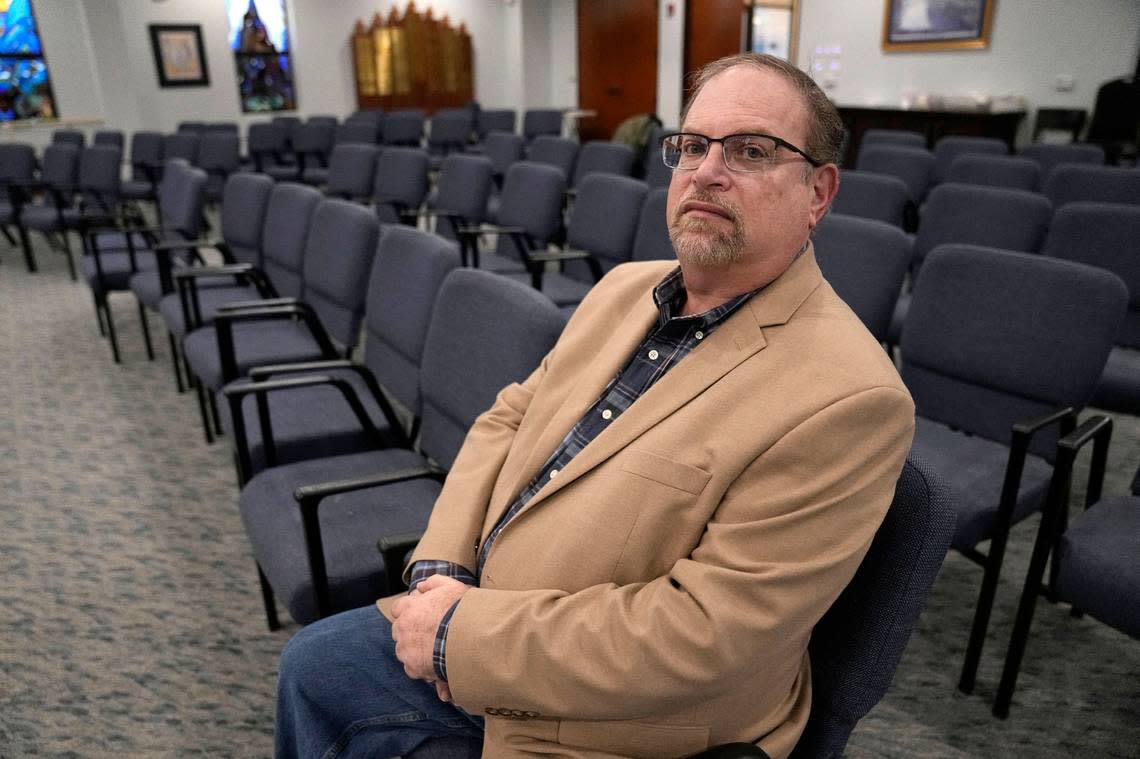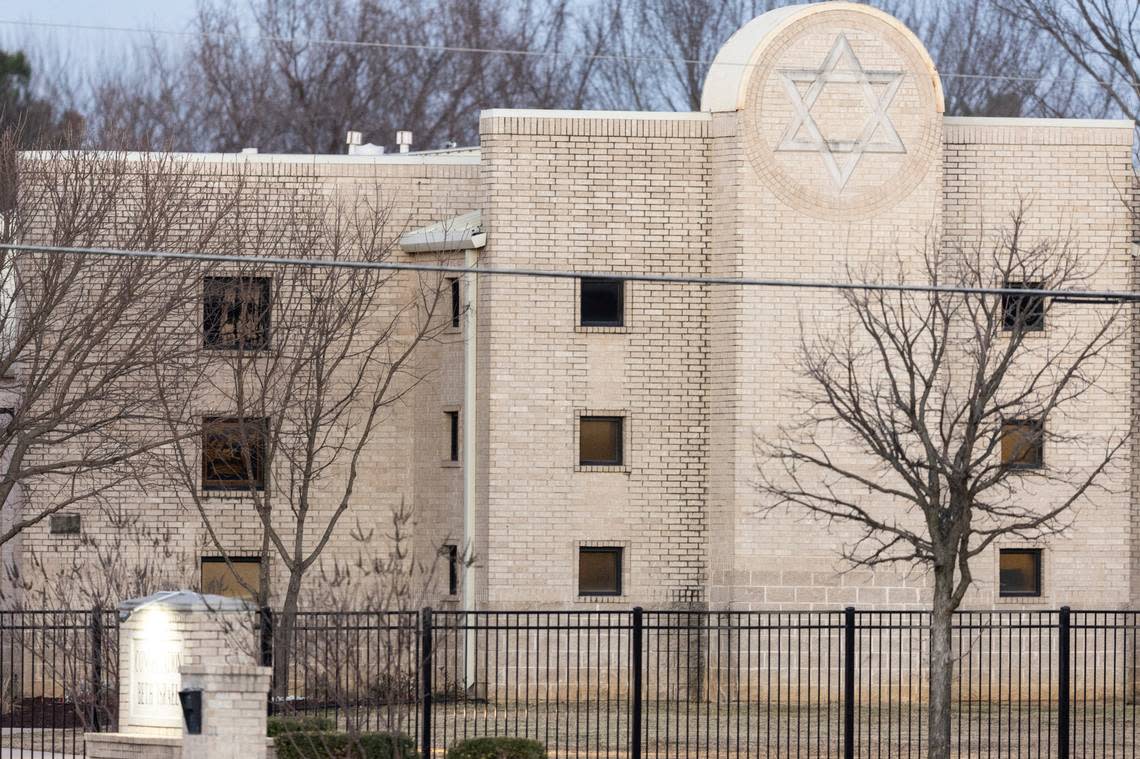‘We are healing, not healed’: A year later, Colleyville synagogue hostage reflects on attack
On a recent Saturday morning, about 20 people gathered at Congregation Beth Israel for Shabbat morning service. A low murmur of voices filled the room as the worshipers recited prayers from the Jewish liturgy.
Only a fraction of the seats were occupied, but Jeffrey Cohen, president of the congregation, said attendance has improved over the last few months.
One year ago on Jan. 15, the Colleyville synagogue was the site of terror when a gunman held the rabbi and three congregants, including Cohen, hostage. In a standoff which began during another Saturday morning service and lasted for 11 hours, 44-year-old British citizen Malik Faisal Akram demanded the release of Aafia Siddiqui, a convicted terrorist whose supporters believe she is innocent, from a Fort Worth prison.
The hostages escaped and Akram was killed by the FBI’s Hostage Rescue Team, but Cohen said the attack “forever changed” the congregation.
“The best thing to say is that we are healing, we’re not healed,” Cohen told the Star-Telegram on Wednesday. “You know, it’s been tough. We’ve had a lot of changes.”

Cohen said some members of the congregation, which includes about 140 families, were not comfortable coming back right after the attack, though more are returning now.
Nowadays, an armed police officer stands guard at the door during every service. Cohen said the congregation has to balance being welcoming while still maintaining security.
“People (have had) their safety and security ripped away,” Cohen said. “You know, no one expects this kind of situation. You can plan for it, and we did, . . . but when things actually happen it affects a lot of people in a lot of different ways.”
Joel Schwitzer, director of the American Jewish Committee’s Dallas office, told the Star-Telegram that antisemitism is a growing trend in the United States.
In a survey published by the AJC in October 2021, 90% of American Jews surveyed thought that antisemitism was “a very serious problem” or “somewhat of a problem.” More than 20% said they had avoided wearing, carrying or displaying items publicly that could identify them as a Jew due to fear of antisemitism.
“(Antisemitism) has a real impact on on the Jewish community,” Schwitzer said. “And of course, all of this was before Colleyville.”

Among the non-Jews who were surveyed, only about 60% said they thought antisemitism was a problem.
The 2022 survey will be published later this month, and Schwitzer said he expects similar results.
“Obviously, there’s not a whole lot of room for . . . the numbers to go up from there,” he said. “But I certainly wouldn’t expect that they would be going down, you know, given Colleyville, given the increased level of antisemitism we’ve seen online from celebrities with tremendous platforms.”
Schwitzer said antisemitism has never gone away, but there are factors exacerbating it and contributing to its rise in recent years. Social media makes it easier for anti-Semites to find each other and celebrities with large followings have been known to spread antisemitic rhetoric.
Rapper Kanye West was recently criticized for antisemitic remarks made on social media and on the controversial Alex Jones Show. West lost contracts with numerous companies, including Adidas, as a result.
According to the Anti-Defamation League, 2021 was the highest year on record for antisemitic incidents since the watchdog organization began gathering data in 1979. ADL statistics show more than 2,700 incidents targeting Jewish people nationwide, including harassment, assault and vandalism. There were 112 such incidents reported in Texas.
In 2022 there were more than 1,900 antisemitic incidents reported across the U.S., with 185 of those occurring in Texas, according to the ADL.
Schwitzer said even though antisemitism continues to be a major problem, he is thankful for the national attention it is getting. Doug Emhoff, the husband of Vice President Kamala Harris, recently hosted a roundtable discussion intended to create a whole government response to combat antisemitism.
Schwitzer also said he saw more media coverage of antisemitism in the days following the Colleyville attack, something he said media had previously shied away from covering.
“In the days after the Colleyville attack, I saw more and more across the news networks discussions of antisemitism and I’m gratified to see that those have continued,” he said. “Even today you hear antisemitism discussed, you know, left, right and center. Whatever your news platform of preference is . . . they do seem to be taking it more seriously, which is really important.”

Cohen said the danger of antisemitic rhetoric is that when some people hear it often enough, they start to internalize it. He is calling for people to challenge those remarks when they hear them.
“It’s not just that you’re trying to convince the person who said it, because you’re not,” Cohen said. “You’re never going to convince them. But it’s important for everyone who’s around to see it. Your kids, your nieces and nephews, the neighbor’s kids. They need to see that there’s consequences to making racist or antisemitic or any other hate- filled remarks like that. It’s not OK. And then we can get back to being the kind of country that we want to be where people have basic respect for each other.”
Cohen said he’s had some rough times since the attack, but overall he is doing OK. He described a time in September during the celebration of the Jewish New Year that he heard emergency vehicles go by with their sirens blaring and he had an immediate reaction.
“The hairs on the back of my neck stood up and I tensed up,” he said. “My pulse went up. I became hyper focused and I just had to bring myself down.”
Cohen said the attack did not affect his faith one way or the other, but the need for enhanced security at the synagogue has affected his Saturday morning service experience.
“It helps me get centered and helps me get my day and then my whole week going better, you know,” Cohen said. “So it’s the fact that it is the same service, that we say the same prayers in the same order ... it’s very calming. And so for the last year, roughly, I’m either working security or I’m working some other aspect of it, so I’m more focused on other things than being able to take my time to relax and unwind.”
